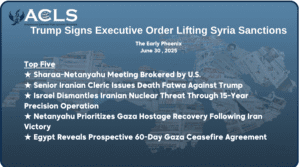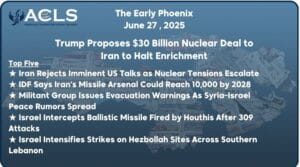The Region: A Middle East Newsletter
THE REGION is a weekly news digest summarizing significant Middle East developments that will be of interest to the English-speaking audience. The news items in THE REGION are curated by ACLS experts and drawn from a wide range of English, Arabic, and other regional language sources. Subscribe to this weekly newsletter and daily intercepts here.
Printable Version
TOP STORY: Turkey-Syria Border Crisis: Turkey Prepares for Ground Invasion of Syria
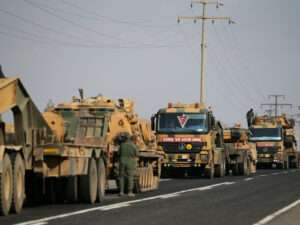
Northern Syria is experiencing its deepest crisis since the end of the battle for Idlib in early 2020. On 1 December, Turkey’s national security council appeared to signal its readiness to conduct a ground offensive into Syria to target the Syrian Kurdish YPG militia, which is the core component of the US-sponsored Syrian Democratic Forces. The council declared that Turkey “will take necessary steps against terrorists and will not allow [the] presence of any terrorist group on its southern borders.” Ankara’s signal is the latest development in three weeks of rising tensions. In the aftermath of the 13 November Istanbul terrorist bombing which killed 6 people, Turkey launched airstrikes and prepared for a ground offensive into northern Syria. Turkish authorities said Ankara is acting within its rights to preserve the country’s national security after attacks they claim originated from the PKK-affiliated YPG inside Turkey and in Syria’s northwest. At the same time, a Syrian opposition military source told media that the YPG had launched at least 100 rocket attacks since June on areas controlled by Turkish-sponsored Syrian opposition forces, leading Turkish forces to prioritize operations to stop these attacks.
Meanwhile, the Syrian Commander of the YPG, Mazloum Kobani, denied his forces had conducted any attacks against Turkey. More importantly, he claimed that the Syrian woman arrested by Turkey for carrying out the Istanbul bombing is actually an ISIS member who had resided in northeast Syria but had no connection with the YPG. After offering condolences to the “martyrs of Damascus,” Mazloum said that the majority of casualties caused by the recent Turkish airstrikes and bombardment were not YPG fighters, but troops of the Syrian regime forces who have been guarding the borders with Turkey since 2019.
The recent Turkish strikes into northeast Syria targeted oil sites and a gas field that are among the main sources of funding for the YPG, as well as a military base for the Assad forces in the area.
Iranian militia forces in the same region reportedly withdrew from Al-Mayadeen, east of Der Ezzor, to different areas along with the Fatemiyoun, Afghani Shiite militias, for unspecified reasons.
The Commander of the Russian Forces in Syria, Alexander Chayko, flew to northeast Syria to meet with Mazloum Kobani at a YPG base near Hasakah that also hosts US forces. Chayko reportedly told Mazloum that Turkey is determined to proceed with a ground operation and that Moscow is unable to stop this operation without giving Turkey security guarantees. The Russian delegation informed Mazloum that Turkey requires the withdrawal of all PKK/YPG/Syrian Democratic Forces from Ain al-Arab, Manbij, and Tal Rifaat, and the handover of the area to Russian forces and the Assad regime’s army. Chayko claimed that this offer is the last that would be made to the YPG.
In an important development on 1 December, however, Ankara reportedly rejected a Russian offer under which Assad regime forces would replace the YPG in the border zone if Turkey agreed to give up its ground invasion. According to Turkish sources, Ankara informed the Russians that it did not consider the presence of Assad regime forces a guarantee that the YPG would vacate the border area, and Turkish leaders insisted on using military force to ensure that the YPG leave the border zone to a depth of 30 kilometers.
For more in-depth analysis of the causes and implications of this crisis, listen to a Twitter Space discussion between the Director of the American Center for Levant Studies, Joel Rayburn, and the Director of the ORSAM center in Ankara, Dr. Ahmet Uysal.
IRAN:
Iranian Protesters Celebrate America’s Soccer Victory over Iran While Iranian Regime Readies Death Sentences
 In an act of defiance to the Khamenei regime, citizens around Iran launched fireworks and took to the streets to celebrate the United States’ World Cup victory over Iran. Regime security forces responded to the celebrations with gunfire, killing a 27-year-old man and injuring others.
In an act of defiance to the Khamenei regime, citizens around Iran launched fireworks and took to the streets to celebrate the United States’ World Cup victory over Iran. Regime security forces responded to the celebrations with gunfire, killing a 27-year-old man and injuring others.
Tehran Times reported that Iran’s Supreme Court held a hearing on November 30 to issue death sentences for four people allegedly tied to the “Mossad.” Iran International, however, explained that “Iran’s judiciary never holds trials transparently and it is not clear if such trials [have] indeed been held.”
After regime forces killed more than 100 people–including a nine-year-old girl–during protests in Iran’s mostly Sunni areas of Sistan and Baluchestan, Revolutionary Guards Commander Hossein Salami visited the region to issue a special warning to its residents. “Today on one side is the Front of Kufr [disbelief] with all its might and on the other is the Front of Islam, one cannot stand in the middle, the lines are clear, one side is led by America and Israel and the other side is led by the Supreme Leader of the revolution [Ali Khamenei] and believers and revolutionaries,” Salami said. He added that the regime’s leaders were determined to “bury plots to target Iran, just as we’ve buried Israeli and American plots in the past.”
While Salami was issuing his threats, the regime leadership was embarrassed when Supreme Leader Khamenei’s niece, Farideh Moradkhani, released a video statement calling on international powers to intervene to stop the regime’s crackdown on protests. By the time her statement was released, Moradkhani had been arrested by her uncle’s own security forces.
The hacktivist group “Black Reward” targeted the IRGC-affiliated Fars News Agency and leaked a video of the agency’s economic editor masturbating at the agency’s office. A few days later, the same group leaked a 123-page document that includes reports and excerpts from domestic and foreign-based Persian media, compiled specially for the eyes of IRGC commander Hossein Salami. Included with the report were direct orders from Supreme Leader Ali Khamenei to security and intelligence bodies to issue statements about the ongoing protests, showing the extent to which Khamenei attempts to micromanage his regime’s response to political or security-related issues.
THE GULF:
U.S. Administration Shows Warmth to Doha, Cold to Riyadh
 Saudi Arabia celebrated a historic World Cup victory over Argentina last week, but departed the competition after losing to Poland and Mexico. Meanwhile, at the annual US-Qatar strategic dialogue, Secretary of State Antony Blinken disclosed that the United States is still reviewing its relations with Saudi Arabia and said there are no plans for Saudi Crown Prince Muhammad Bin Salman to visit the United States. At the same time, Blinken hailed Washington’s “strong partnership” with Qatar.
Saudi Arabia celebrated a historic World Cup victory over Argentina last week, but departed the competition after losing to Poland and Mexico. Meanwhile, at the annual US-Qatar strategic dialogue, Secretary of State Antony Blinken disclosed that the United States is still reviewing its relations with Saudi Arabia and said there are no plans for Saudi Crown Prince Muhammad Bin Salman to visit the United States. At the same time, Blinken hailed Washington’s “strong partnership” with Qatar.
Qatar will begin supplying Germany with gas after both countries signed a 15 year deal. Local Arabic media sources judged that the agreement may lead Germany to reorient its foreign policy toward Qatar, which has been marked by criticism of Qatar’s human rights record, especially on LGBT-Q+ issues.
SYRIA:
Free Syrian Army Kills the ISIS “Caliph” and Uncovers His Links to the Assad Regime
 In an unusual step, the U.S. Central Command on 30 November publicly revealed that the overall leader of ISIS, Abu al-Hasan al-Hashemi al-Quraishi, had been killed in mid-October near Deraa in southern Syria. The Central Command said that the United States had not been involved in the operation to kill the ISIS leader, but instead the “Free Syrian Army” had conducted the operation. The extremely rare U.S. mention of the Free Syrian Army prompted speculation in the Syrian media over what exactly had happened, and whether the United States might be revising its posture toward the Syrian military opposition. Meanwhile, the Free Horan Gathering, a military opposition group, stated that they had arrested several ISIS leaders and, upon questioning them, had discovered that the ISIS leadership is linked to Assad regime security officers in Deraa.
In an unusual step, the U.S. Central Command on 30 November publicly revealed that the overall leader of ISIS, Abu al-Hasan al-Hashemi al-Quraishi, had been killed in mid-October near Deraa in southern Syria. The Central Command said that the United States had not been involved in the operation to kill the ISIS leader, but instead the “Free Syrian Army” had conducted the operation. The extremely rare U.S. mention of the Free Syrian Army prompted speculation in the Syrian media over what exactly had happened, and whether the United States might be revising its posture toward the Syrian military opposition. Meanwhile, the Free Horan Gathering, a military opposition group, stated that they had arrested several ISIS leaders and, upon questioning them, had discovered that the ISIS leadership is linked to Assad regime security officers in Deraa.
In other news about Syria’s southern borders, Jordan announced on 30 November that it had captured one of the large drug shipments that are smuggled from Syria on virtually a daily basis. The Jordanians reported that they had seized more than 600,000 Captagon pills in the shipment.
The Syrian media outlet Orient reported that a dissident member of an Assad regime militia revealed the locations of five major Iranian military headquarters in Syria, the most prominent of which was located in Damascus’s suburbs. According to former regime defected officers, top Iranian officials manage all the other headquarters from the “glass house” building located on the outskirts of Damascus International Airport. The five-floor building was constructed with reinforced walls that protect it from explosions. “Not everyone knows that these command headquarters are located in fortified underground rooms,” said Quasi Al-Mousa, the military defector who served within the Special Units Command in Qaboun, Damascus.
IRAQ:
Iranian Regime Threatens to Invade Iraq
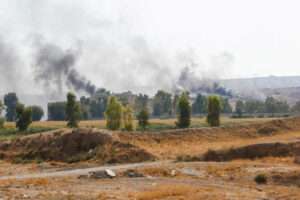 Following large-scale Iranian artillery strikes into Iraqi territory that killed hundreds of people, the commander of Iran’s Quds Force, Ismail Qani, traveled to Baghdad last week to warn Prime Minister Sudani and other Iraqi leaders that if Baghdad failed to “fortify its borders,” then the Iranian regime would mount a ground invasion of Iraq. Since the onset of nationwide protests inside Iran, the Iranian regime has accused parties in Iraq’s Kurdistan region of stoking the unrest inside Iran. Qani’s threat came after Sudani had previously sent his national security adviser, a senior figure in the Iranian-backed “Badr Brigades,” to Tehran to try to negotiate an end to Tehran’s military strikes against northern Iraq. Following Qani’s visit to Baghdad, Iraq’s National Security Council announced on 23 November that it will be developing a plan to deploy Iraqi border forces to secure Iraq’s borders with Iran and Turkey.
Following large-scale Iranian artillery strikes into Iraqi territory that killed hundreds of people, the commander of Iran’s Quds Force, Ismail Qani, traveled to Baghdad last week to warn Prime Minister Sudani and other Iraqi leaders that if Baghdad failed to “fortify its borders,” then the Iranian regime would mount a ground invasion of Iraq. Since the onset of nationwide protests inside Iran, the Iranian regime has accused parties in Iraq’s Kurdistan region of stoking the unrest inside Iran. Qani’s threat came after Sudani had previously sent his national security adviser, a senior figure in the Iranian-backed “Badr Brigades,” to Tehran to try to negotiate an end to Tehran’s military strikes against northern Iraq. Following Qani’s visit to Baghdad, Iraq’s National Security Council announced on 23 November that it will be developing a plan to deploy Iraqi border forces to secure Iraq’s borders with Iran and Turkey.
On the same day Iraqi leaders decided to deploy their border forces to the north, Prime Minister Sudani made a brief visit to Kuwait to meet Kuwait’s Crown Prince and Prime Minister. The Iraqi and Kuwaiti leaders issued a joint statement emphasizing the importance of cooperation between the two countries at the parliamentary, governmental, and societal levels.
On November 30, Prime Minister Sudani led a delegation to Tehran reportedly for talks to forestall the Iranian military incursion into Iraq that Qani had warned about. Sudani reportedly offered assurances to the Iranian regime that the Iraqi government would not “allow the use of Iraqi territory to threaten Iran’s security” and offered further new arrangements for securing the border between Iran and the Iraqi Kurdistan region. Although Sudani offered these assurances directly in meetings with Supreme Leader Khamenei, Khamenei responded by stating that he doubted Iraq’s ability to control its borders, and, in an implied criticism of the Kurdistan Regional Government, said that the Iraqi central government must extend its control over all of Iraq’s regions.
On the domestic front, Sudani gave a live press conference on 27 November to announce the recovery of $125 million out of the $2.5 billion stolen by former government officials in the fake contract scandal known as the “Theft of the Century”. Sudani gave his press conference while standing onstage next to large stacks of cash representing the money that had been recovered.
In other news, Arabic media reported that an investigative court in Baghdad had received a new lawsuit against former U.S. President Donald Trump, former Secretary of State Mike Pompeo, and former Iraqi Prime Minister Mustafa Al-Kazemi for their alleged roles in the killing of Iraqi militant leader Abu Mahdi Al-Muhandis. Muhandis was killed in the American military strike that killed Qasim Sulimani in Baghdad in January 2020.
YEMEN:
Houthis and IRGC Determined to Continue Strikes Against Yemeni Ports
 Last week the Houthis continued to attack Yemeni ports in an attempt to disrupt the oil trade into Yemeni government controlled areas. On 21 November Reuters reported that a Panamanian-flagged vessel was forced to evacuate from the Yemeni oil port of Al-Dhaba after the Houthis launched a missile attack from an Iranian made drone. In response to the repeated Houthi attacks, on 28 November the United States demanded that the Houthis cease their targeting of Yemen’s ports and announced that US Special Envoy for Yemen Tim Lenderking would travel to Saudi Arabia and Oman to coordinate with regional countries on this issue. Two days later, Houthi leaders defiantly announced their intention to launch further attacks on ports, oil installations, and ships with the assistance of Iran’s Revolutionary Guards.
Last week the Houthis continued to attack Yemeni ports in an attempt to disrupt the oil trade into Yemeni government controlled areas. On 21 November Reuters reported that a Panamanian-flagged vessel was forced to evacuate from the Yemeni oil port of Al-Dhaba after the Houthis launched a missile attack from an Iranian made drone. In response to the repeated Houthi attacks, on 28 November the United States demanded that the Houthis cease their targeting of Yemen’s ports and announced that US Special Envoy for Yemen Tim Lenderking would travel to Saudi Arabia and Oman to coordinate with regional countries on this issue. Two days later, Houthi leaders defiantly announced their intention to launch further attacks on ports, oil installations, and ships with the assistance of Iran’s Revolutionary Guards.
EGYPT:
Sisi and Erdogan Begin to Mend Relations After Nine-Year Rupture
 Last week Egyptian President El- Sisi, while attending the World Cup in Qatar, met with Turkish President Erdogan for talks that ended nine years of severed relations between the two leaders. A week later, on 27 November, President Erdogan related to the press that he told Sisi he is keen to end the rupture between Turkey and Egypt and resolve the two countries’ disagreements in the Mediterranean. Erdogan added that the two countries could also resolve their disagreements concerning Syria. His optimistic comments came just five days after Egypt and Greece signed agreements on aeronautical and maritime search and rescue missions.
Last week Egyptian President El- Sisi, while attending the World Cup in Qatar, met with Turkish President Erdogan for talks that ended nine years of severed relations between the two leaders. A week later, on 27 November, President Erdogan related to the press that he told Sisi he is keen to end the rupture between Turkey and Egypt and resolve the two countries’ disagreements in the Mediterranean. Erdogan added that the two countries could also resolve their disagreements concerning Syria. His optimistic comments came just five days after Egypt and Greece signed agreements on aeronautical and maritime search and rescue missions.
LIBYA:
EU Parliament Asks Libya to Cancel Maritime Agreement with Turkey
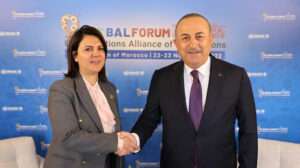 On 22 November, Turkish Foreign Minister Cavasoglu and Libyan Foreign Minister Najla Mangoush met on the sidelines of a UN conference in Morocco and revalidated the two countries’ agreements concerning stability efforts in Libya. The following day, however, the European Parliament urged the Libyan government to cancel its 2019 maritime MOU with Turkey. The Parliament’s statement expressed concern that the 2019 MOU could lead to illegal drilling activities in other countries’ exclusive economic zones, including those of Greece and Cyprus.
On 22 November, Turkish Foreign Minister Cavasoglu and Libyan Foreign Minister Najla Mangoush met on the sidelines of a UN conference in Morocco and revalidated the two countries’ agreements concerning stability efforts in Libya. The following day, however, the European Parliament urged the Libyan government to cancel its 2019 maritime MOU with Turkey. The Parliament’s statement expressed concern that the 2019 MOU could lead to illegal drilling activities in other countries’ exclusive economic zones, including those of Greece and Cyprus.
LEBANON:
Lebanon Still Has no President
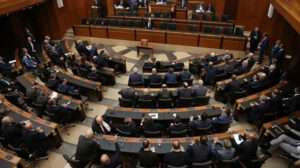 On 1 December the Lebanese parliament held an eighth session to elect a new president, but for the eighth consecutive session no candidate garnered enough votes to fill the office. The presidency has been vacant since the end of Michel Aoun’s term on 31 October. As in the seven previous sessions, independent MP Michel Mouawad received the most votes, with 37 this time, but that total fell short of the two-thirds required to be elected. Meanwhile, while attending the World Cup in Qatar, Aoun’s son-in-law Gibran Bassil, himself an aspirant for the presidency, reportedly met with Qatari officials to discuss the political impasse in Lebanon. According to Lebanese media, the Qataris asked Bassil to agree on a compromise that would result in Lebanese Army Commander General Joseph Aoun being elected to the presidency.
On 1 December the Lebanese parliament held an eighth session to elect a new president, but for the eighth consecutive session no candidate garnered enough votes to fill the office. The presidency has been vacant since the end of Michel Aoun’s term on 31 October. As in the seven previous sessions, independent MP Michel Mouawad received the most votes, with 37 this time, but that total fell short of the two-thirds required to be elected. Meanwhile, while attending the World Cup in Qatar, Aoun’s son-in-law Gibran Bassil, himself an aspirant for the presidency, reportedly met with Qatari officials to discuss the political impasse in Lebanon. According to Lebanese media, the Qataris asked Bassil to agree on a compromise that would result in Lebanese Army Commander General Joseph Aoun being elected to the presidency.


